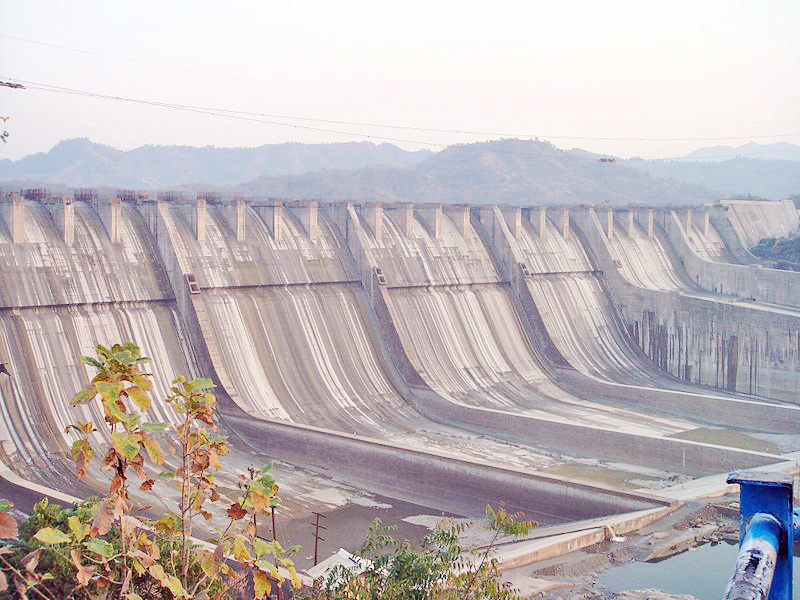The news stories describing the welcome that the cadre-police combine gave Arvind Kejriwal during his recent tour of Gujarat are all too familiar. The script of the drama that unfolded with the AAP leader being shown black flags, taken to the police station, the windshield of his car being smashed - all inspired a sense of deja vu. Yet again, it made me aghast at the loss of imagination that the pro-dam party cadres suffer from, as they shouted slogans against the emerging political leader for being – hold your breath – anti-Narmada.
Anti-Narmada? If one shouts in one’s mother tongue a rough translation of “Save the river Narmada” does that merit the quick repartee of being Anti-Narmada? Haven’t I witnessed very respectable friends and family members also make the mistake of taking the name of the river to be merely an adjective?
Linguistically speaking, when we use the proper name of something natural (in this case, a river) only to act as adjectives that take a default human architectural intervention (in this case, a large dam) as the following noun, what risks do we run? We run the risk of losing the humane traditions that maintain the sanctity of proper nouns, as they were meant to be. Narmada is lost forever in the tussle between the ‘pro-Narmada’ and ‘anti-Narmada’ - the supporters and detractors of the ‘Narmada-dam’ project.
This trend is not limited to a specific river or the movement against dam-building over it. Chimanbhai Patel, Chief minister of Gujarat in the early 90s, unleashed a violent effort to manufacture consent by inventing curious equations such as ‘those who are anti-Narmada are anti-Gujarat’. The present incumbent has merely kept with the tradition by encouraging party cadres and supporters to toe a similar, ‘those who criticise Narendra Modi’s model of development are anti-Gujarat’ line.
Interestingly, the name Sardar, too, was first used by Gandhi as a proper noun in a specific context during the anti-colonial struggle, but we have now started applying it across the board as a mere adjective to describe our roads, welfare schemes and statues - the very things that these brilliant leaders themselves might have cultivated a dislike for!

The Sardar Sarovar Dam on river Narmada. Pic: Wikimedia
Gagging culture
Many years ago, I heard on television that a young woman had bagged a prestigious award from the ‘English wallas’ for her piece of fiction titled The God of Small Things. As a student aspiring to study Literature, I was curious about her work and wondered if she would keep writing such brilliant fiction for the next fifteen years. Just a couple of years later, as she started to pen political prose against India’s nuclear overtures and enthusiasm for large dam building, she was at once reduced to a persona non grata.
All my friends suddenly dropped their praise for her writing. A query at my favourite bookstore about the Gujarati translation of her book, For Greater Common Good attracted a piercing stare. The shop owner, whom I addressed as Uncle, whispered in my ears, “Didn’t you hear the copies of her book were burnt down?” I tried to cajole him into letting me get one out of the few copies that he may have saved, but to no avail.
The response that Arundhati Roy’s writing on nuclearisation and the Narmada river generated in Gujarat was not quite unfamiliar even then. In the early 90s, as the movement against the large dam gathered momentum and Baba Amte walked along with people in protest from Badawani to Kevadiya, the march was stopped at the border village of Ferkuva.
As an eighteen year old, I used to read the Gujarati language newspapers reporting on the NBA with an increasingly vitriolic tone, day after day. Then there came like a fresh wind, a cover story penned by Sheela Bhatt in my favourite weekly magazine, Abhiyan. In a scathing exposé, she pierced through the state controlled PR machinery and the organised nature of pro-dam counter-mobilisation.
Chimabhai Patel, then CM, had already started to anoint the phrase Gujarati Asmita with violent overtones. Any efforts to talk about water policy in the Gujarat capital would meet with attacks by an obsessive witch-hunt that kept referring to pro-Narmada activists as ‘Medha AaNi MandaLi”, and ‘Nivedan Bahadur Andolan’.
In the years that followed, I was witness to some of the most brilliant social scientists positing the flawed binary opposition between ‘asargrast’ (project affected) and ‘acchatgrast’ (scarcity affected), thereby granting the ‘There Is No Alternative (TINA)’ theory undeserved currency.
I have also witnessed first-hand how police and party cadre combine moves in an expected manner at the slightest sign of Medha Patkar being seen in the vicinity of the rehabilitation and resettlement (R&R) sites in Gujarat. This occurred first during a public hearing at Kevadiya, a dam site town, and then on numerous other occasions as she persisted with her activism.
In 2006, when television cameras went into an overdrive talking about Aamir Khan’s support to the cause of oustees, I half guessed what would unfold at the NBA’s office in Baroda. That evening a journalist friend broke the news to me that the office had been ransacked and attacked yet another time.
Over the past few days, I have bored myself with television advertisements from the two leading mainstream political parties, all of which appear to be along the lines of the once-famous ‘India Shining’ campaign. However, for a cadre of a party that doesn’t tire of announcing that the entire world is coming to Gujarat and is welcome to do so, shouting ‘Go back’ to an emerging political leader somehow doesn’t quite match the copy.
But, that is perhaps all one can expect when we have a history of Gandhians shouting ‘Go back’ against Gandhians at Ferkuva and a community that takes pride in having reduced the name of a river to an adjective that describes anything but a river!
























